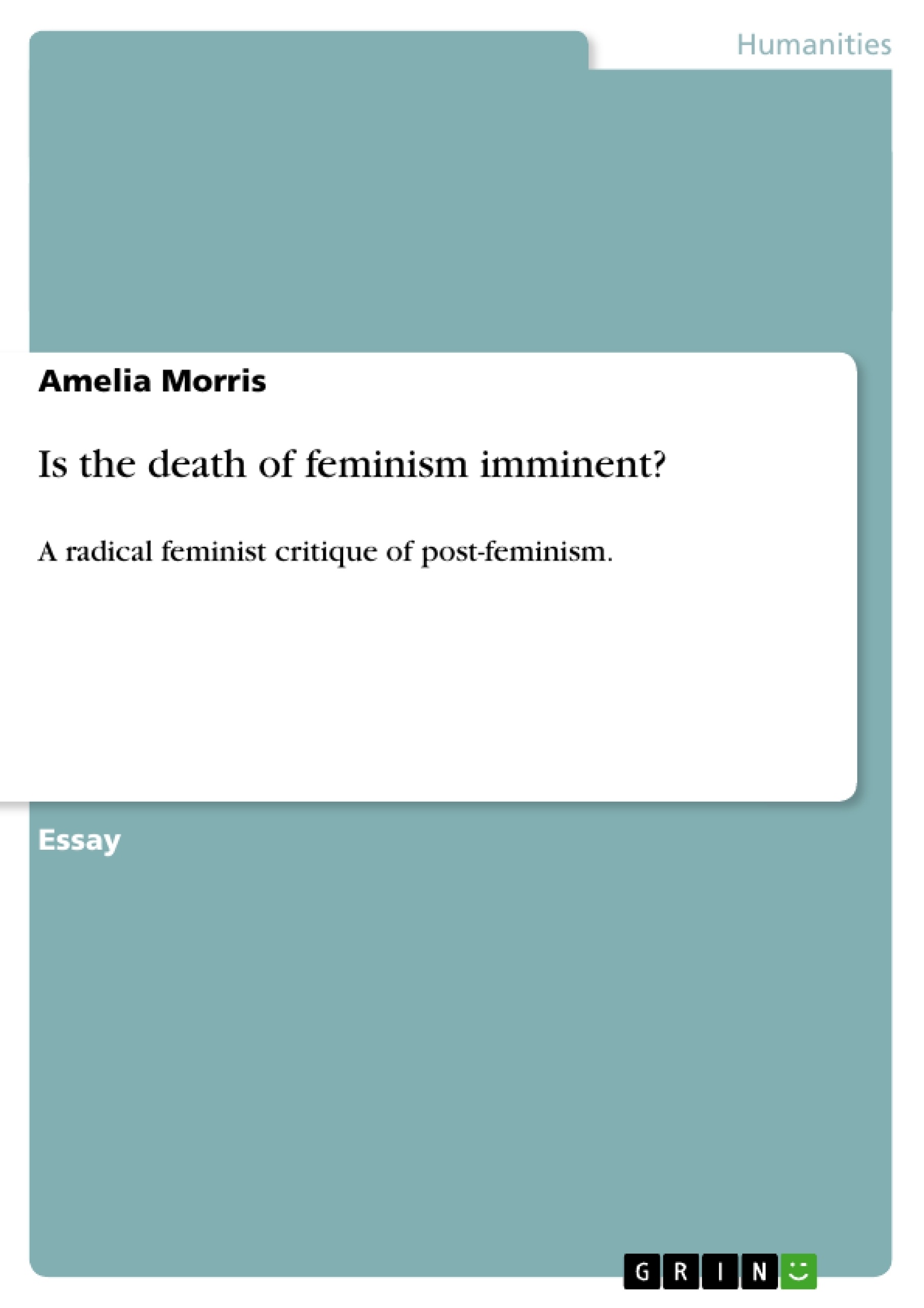Feminism observes and problematizes the fundamentally political relationship between gender and power (Stoker, 2002, p. 129), insisting upon ending sexist exploitation and oppression of women (Hooks, 2000, p. 1). However, post-feminists argue that feminism achieved its goals and is consequently ‘dying’ (Walby, 2011, p. 2). This essay will argue that the death of feminism is not imminent. Firstly, I will outline Naomi Wolf’s argument that feminism is irrelevant as power is “there for the taking” (Browne, 2001, p. 53) , if women stop viewing themselves as ‘victims’ (Wood, 2013, p. 86). I will agree with Germaine Greer that such arguments appeal to privileged women who do not understand discrimination (Wood, 2013, p. 87). Secondly, I will argue that post-feminist trends such as “Raunch Culture” attempted to reject feminism as “embarrassingly out of touch” (Stéphanie Genz, 2009, p. 12). Conversely, I will agree with Ariel Levy and Sylvia Walby that such consumerist trends are inequalities re-casted as ‘liberating’ (Powell, 2010, p. 76). Next, I will agree with Greer that feminism is not redundant, but needed now more than ever (UKFeminista, 2012). Women still face ridicule, objectification and violence (O'Hagan, 2012) despite apparent “emancipation.” Therefore, such trends are a danger to feminism as they encourage young women not to challenge the social order and dismiss feminist activism as superfluous (Claudia A. Mitchell, 2008, p. 313). Finally, I will argue that despite “feminist backlash” in the media (Worell, 2002, p. 467), feminist resistance is still alive through groups such as “UK Feminista” (Chafetz, 2006, p. 161). In summary, the essay will argue that ‘Power Feminism’, ‘Raunch Culture’ and ‘Girl Power’ have endangered feminism by declaring themselves as an ‘improved’ feminist thought (Stéphanie Genz, 2009, p. 12) whilst referring to feminism as ‘out of touch’ (Stéphanie Genz, 2009, p. 12). Backlash from the media has also threatened feminism by demonizing feminists as ‘man-hating dykes’ and ignoring its past and present achievements (Worell, 2002, p. 467). However, feminist resistance is still alive and an “unfinished revolution” (Davies, 2011).
Inhaltsverzeichnis (Table of Contents)
- The Death of Feminism?
- The Death of Feminism?
- Power Feminism
- Raunch Culture
- The Backlash Thesis
- Feminist Backlash
- Post-Feminist Trends
- The Rise of 'Girl Power'
- The Rise of 'Raunch Culture'
Zielsetzung und Themenschwerpunkte (Objectives and Key Themes)
This essay aims to challenge the notion that feminism is a dying force, exploring the arguments of post-feminist scholars who claim feminism has achieved its goals and is no longer relevant. The essay counters these arguments by analyzing the continuing struggles women face in a patriarchal society, highlighting how trends like "Power Feminism" and "Raunch Culture" can actually undermine feminist goals.
- The persistence of gender inequality and the need for continued feminist activism
- Critiques of post-feminist arguments that claim women have achieved equality
- The impact of "Power Feminism" and "Raunch Culture" on feminist goals
- The role of media in shaping public perception of feminism and its achievements
- The ongoing relevance and importance of feminist resistance in the contemporary world
Zusammenfassung der Kapitel (Chapter Summaries)
The first chapter focuses on the arguments of post-feminist scholars, such as Naomi Wolf, who claim that feminism is irrelevant because women can now achieve power and success without feminist frameworks. The author critiques this argument by highlighting its appeal to privileged women who have not experienced discrimination, and argues that such stances perpetuate gender inequalities.
The second chapter delves into the rise of "Girl Power" and "Raunch Culture," post-feminist trends that present seemingly empowering narratives around women's assertiveness and sexual liberation. However, the author argues that these trends ultimately reinforce existing inequalities by recasting them as liberating choices. Examples are used to illustrate how these trends contribute to the disconnection between women and feminist action.
The third chapter examines the concept of "feminist backlash," exploring the media's demonization of feminism as an anti-man movement. The author argues that this backlash serves to obscure feminism's achievements and promotes the idea that feminism is failing rather than succeeding.
Schlüsselwörter (Keywords)
This text examines the concepts of feminism, post-feminism, gender inequality, "Power Feminism," "Raunch Culture," "Girl Power," feminist backlash, and feminist resistance. It explores the impact of these ideas on women's lives and challenges the notion that feminism is no longer relevant or necessary.
- Quote paper
- Amelia Morris (Author), 2013, Is the death of feminism imminent?, Munich, GRIN Verlag, https://www.grin.com/document/267493




